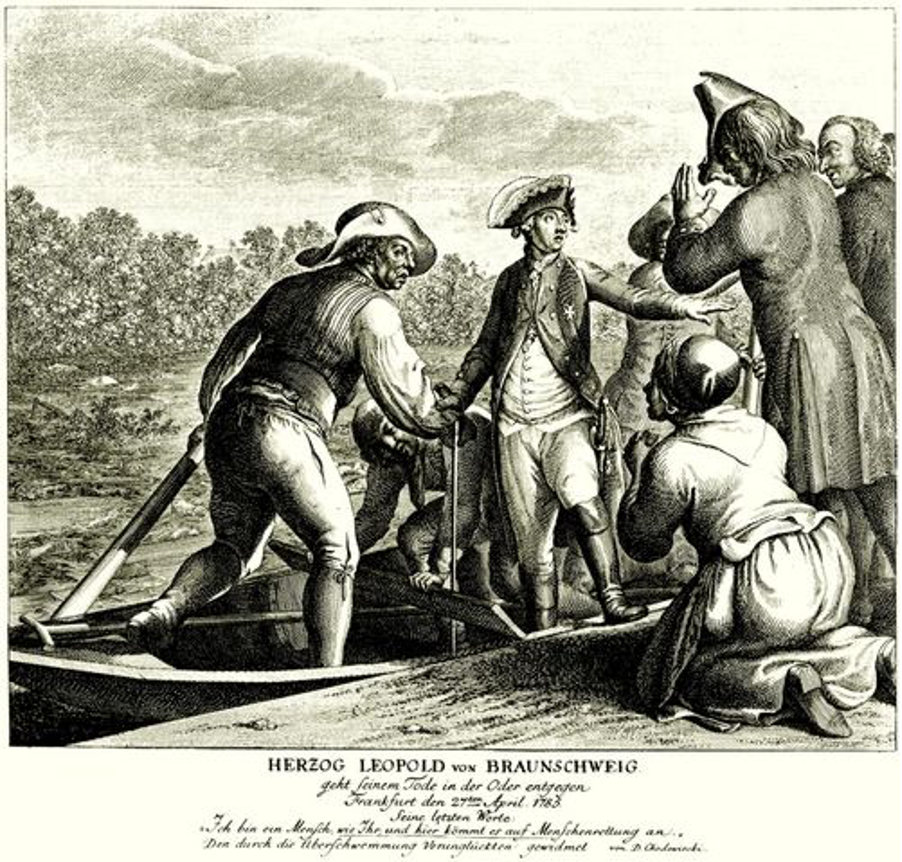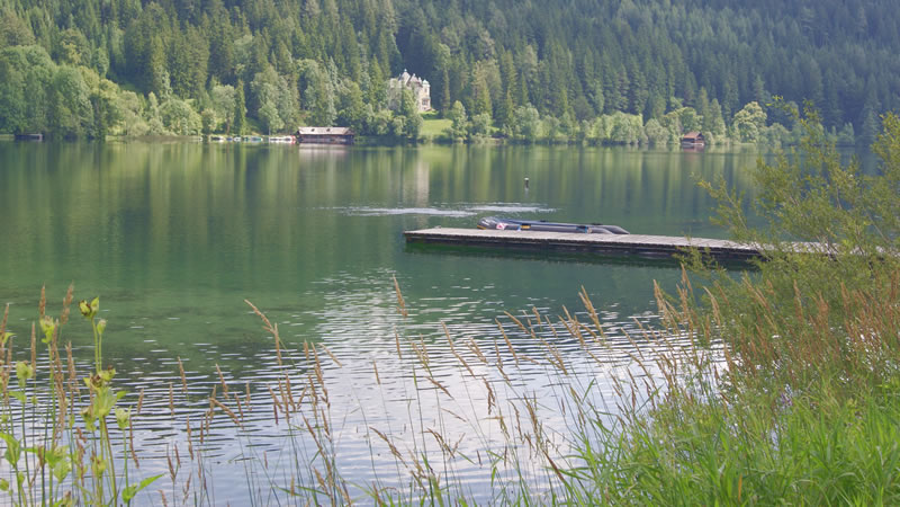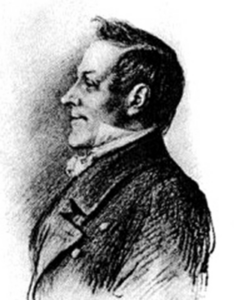By the lake
(Poet's title: Am See)
Set by Schubert:
D 124
[December 7, 2014]
Sitz ich im Gras am glatten See,
Beschleicht die Seele süßes Weh,
Wie Äolsharfen klingt mich an
Ein unnennbarer Zauberwahn.
Das Schilfrohr neiget seufzend sich,
Die Uferblumen grüßen mich,
Der Vogel klagt, die Lüfte wehn,
Vor Schmerzeslust möcht ich vergehn!
Wie mir das Leben kräftig quillt
Und sich in raschen Strömen spielt.
Wie’s bald in trüben Massen gärt
Und bald zum Spiegel sich verklärt.
Bewusstsein meiner tiefsten Kraft
Ein Wonnemeer in mir erschafft.
Ich stürze kühn in seine Flut
Und ringe um das höchste Gut!
O Leben, bist so himmlisch schön,
In deinen Tiefen, in deinen Höhn,
Dein freundlich Licht soll ich nicht sehn,
Den finstren Pfad des Orkus gehn?
Doch bist du mir das Höchste nicht,
Drum opfr’ ich freudig dich der Pflicht!
Ein Strahlenbild schwebt mir voran,
Und mutig wag ich’s Leben dran.
Das Strahlenbild ist oft betränkt,
Wenn es durch meinen Busen brennt:
Die Tränen weg vom Wangenrot,
Und dann in tausendfachen Tod!
Du warst so menschlich, warst so hold,
O großer deutscher Leopold!
Die Menschheit füllte dich so ganz
Und reichte dir den Opferkranz.
Und hehr geschmückt sprangst du hinab,
Für Menschen in das Wellengrab.
Vor dir erbleicht, o Fürstensohn,
Thermopylae und Marathon!
Das Schilfrohr neiget seufzend sich,
Die Uferblumen grüßen mich,
Der Vogel klagt, die Lüfte wehn,
Vor Schmerzeslust möcht’ ich vergehn!
When I sit in the grass by the unruffled lake
A sweet pain creeps up on my soul,
As if Aeolian harps were reminding me of
An unutterable magical madness.
The reeds bend over as they sigh,
The flowers on the bank greet me,
The bird laments, the breezes waft,
I feel like dying of blissful melancholy.
How life wells up in me so strongly
And plays around in rapid currents.
How quickly it ferments in cloudy mixtures
And then quickly becomes as clear as a mirror.
Awareness of my deepest power
Creates a sea of joy in me.
I plunge boldly into its flooding waters
And I struggle to attain the highest good.
Oh life, you are so heavenly beautiful,
In your depths, in your heights!
Shall I not see your friendly light
Shall I go along the darker path of Orcus?
But you are not the highest for me.
I therefore willingly sacrifice you for duty.
A radiant image is hovering ahead of me,
And I courageously risk my life for it!
The radiant image is often watered
When it burns through my heart
Drying off the tears from my red cheeks
And then in a thousandfold death.
You were so human, so fair,
Oh great, German Leopold.
Humanity filled you up so totally
And offered you the wreath of sacrifice.
And majestically adorned you jumped in,
To save human beings you went into a watery grave.
Before you, oh son of a Prince, pale both
Thermopylae and Marathon.
The reeds bend over as they sigh,
The flowers on the bank greet me,
The bird laments, the breezes waft,
I feel like dying of blissful melancholy!
All translations into English that appear on this website, unless otherwise stated, are by Malcolm Wren. You are free to use them on condition that you acknowledge Malcolm Wren as the translator and schubertsong.uk as the source. Unless otherwise stated, the comments and essays that appear after the texts and translations are by Malcolm Wren and are © Copyright.
☙
Themes and images in this text:
Bending Birds By water – beaches and general Cheeks Chest / breast Emptiness and fullness Fighting and wrestling Fire Floods and tides Flowers Grass Graves and burials Harps and Aeolian harps Heaven, the sky High, low and deep Joy Lakes Laments, elegies and mourning Light Madness Magic and enchantment Melancholy Mirrors and reflections Not moving Pain Paths Pictures and paintings Red and purple Reeds Rivers (Strom) Sacrifice The sea Soul Surface of the water Surging Tears and crying Under the water, sinking and drowning The underworld (Orcus, Hades etc) Waves – Welle Wind Wreaths and garlands
There is a deliberate disjunction between Leopold’s grand title and his supposed final words. As he set off to rescue people[1] trapped by the rising floodwaters of the River Oder on 27th April 1785, Leopold Prince of Braunschweig-Wolfenbüttel and Duke of Braunschweig and Lüneburg declared, “I am a human being like you, and this is a matter of saving human beings.” This nephew of Frederick the Great was an active Freemason, so there was a ready-made network to encourage sales of the engraving below, intended to raise funds for the survivors of the floods (and for the soldiers of his regiment) and to spread the story of enlightened self-sacrifice. The fact that the Prince was about 33 years old when he drowned (the same age as Jesus when he was crucified) must have helped the myth to spread.

It is impossible to know when Mayrhofer wrote this reflection on Leopold’s death, but it was shown to Schubert by Spaun in late 1814 and it became the first of Schubert’s Mayrhofer settings. Schubert was 17 at this point, Mayrhofer 27 and Spaun 26, and they had all just lived through the excitement of the War of Liberation as Austria and Prussia (Leopold had been a Prussian, but also had obligations and rights deriving from the Holy Roman Empire) had finally (they thought) defeated Napoleon. They must all have known men who had died too young, many having committed great deeds of bravery to save others. The cult of Leopold thus took on a new appeal to the next generation.
For Mayrhofer there seems to have been an added appeal: death by drowning. His poems repeatedly refer to the lure of the deep and at least one of his suicide attempts (that in 1831) involved jumping into the Danube. Schubert must have become aware of this since he set the following texts, all of which link death and water: Liane (D 298), Lied eines Schiffers an die Dioskuren (D 360), Geheimnis (D 491), Abendlied der Fürstin (D 495), Der Schiffer (D 536), Augenlied (D 297), Wie Ulfru fischt (D 525), Fahrt zum Hades (D 526), Schlaflied (D 527), Am Strome (D 539), Auf der Donau (D 553), Atys (D 585), Erlafsee (D 586), Freiwilliges Versinken (D 700), Gondelfahrer (D 808, D 809).
Let us not fall into the trap of thinking that the poems must in some way be autobiographical, though. It may be that Mayrhofer created the persona of the texts, with his interest in death by water, as a sort of exercise or a way of imagining what it might be like to think and feel in such a way. At a later point, life could have imitated art as he decided to take the plunge himself, coming to identify with the persona he had created.

The poetic ‘I’ starts out sitting by the smooth waters of the lake, and is ‘in’, not ‘on’, the grass. This is no manicured lawn leading down to the water, so it could be the Erlaufsee (southwest of Vienna in the foothills of the Alps), the subject of Mayrhofer’s Erlafsee, which starts with a similar setting:
Mir ist so wohl, so weh,
Am stillen Erlafsee.
I am in such ecstasy and such pain
by the calm lake of Erlaf.
Sitting in the grass (which presumably includes reeds or bulrushes) the speaker becomes aware of a sensation that is both magically blissful and ineffably painful. At first he is not really conscious of the water; he sees the reeds bending in the wind, he feels the breeze and he hears a bird’s singing as a lament. This leads to an awareness of life welling up. As he reflects on the water in front of him he feels the surging of the muddy eddies within and the contrast with the unruffled surface.
The beauty is in what is intuited rather than in what is seen directly. The beauty is also in the horror and turbulence that is hidden in the darkness under the water. The beauty is in the contrast between the clarity of the surface and the obscurity of the depths. The speaker knows that he has to follow the path into the darkness, towards Orcus (the vestibule of the underworld). Ordinary ‘surface’ light is not the highest value when another shining light, the example of self-sacrificing Leopold, calls us to an even higher duty. We will only become full human beings by plunging into the flood as he did. The highest will be attained in the depths.
Leopold offers a German version of the sacrifice of Leonidas and his valiant 300 at the Battle of Thermopylae in 580 BC (Herodotus VII: 223). Just as the Spartans knew they were going to their own deaths when they decided to defy Xerxes and the Persians, and just as the Athenians had defeated the previously invincible forces of the Persian Empire at Marathon (590 BC), the Germans had now produced their own victory over Napoleon and his terrifying Imperial forces. The radiant image of Friedrich of Brunswick (as seen in the propaganda print with his ‘final words’ about saving human beings) now shines even brighter than the heroes of old.
There remains a strange absence in the text, though. We have a calm lake on a clear day (if there is wind it is only a breeze sufficient to bend the reeds, it does not seem to be threatening a storm). We have a memory of ancient fighters who gave their lives to defeat invaders and more recent heroes who have now expelled the French. We are reminded (looking at the water and sensing the difference between the surface and the depth) of a particular role model who plunged in and offered himself to save others. So who needs saving now? What disaster threatens? If the poetic persona is being called on to sacrifice himself, what principles or what hostages need defending in this way? Isn’t the self-sacrifice rather self-indulgent? Or might there be some more virulent enemy within (us) that needs to be overcome by the force of poetry and its ability to take us beneath the surface?
[1] Recent research by Anton Pumpe (2008) suggests that the motivation may have been less highminded; he got on the boat to save his and his regiment’s property.
☙
Original Spelling Am See Sitz' ich im Gras am glatten See, Beschleicht die Seele süßes Weh, Wie Äolsharfen klingt mich an Ein unnennbarer Zauberwahn. Das Schilfrohr neiget seufzend sich, Die Uferblumen grüßen mich, Der Vogel klagt, die Lüfte wehn, Vor Schmerzeslust möcht' ich vergehn! Wie mir das Leben kräftig quillt Und sich in raschen Strömen spielt. Wie's bald in trüben Massen gährt Und bald zum Spiegel sich verklärt. Bewußtsein meiner tiefsten Kraft, Ein Wonnemeer in mir erschafft. Ich stürze kühn in seine Fluth Und ringe um das höchste Gut! O Leben, bist so himmlisch schön, In deinen Tiefen, in deinen Höh'n. Dein freundlich Licht soll ich nicht sehn, Den finstren Pfad des Orkus gehn? Doch bist du mir das Höchste nicht: Drum opfr' ich freudig dich der Pflicht. Ein Strahlenbild schwebt mir voran, Und mutig wag' ich's Leben dran! Das Strahlenbild ist oft betränkt, Wenn es durch meinen Busen brennt, Die Tränen weg vom Wangenrot, Und dann in tausendfachen Tod. Du warst so menschlich, warst so hold, O großer deutscher Leopold! Die Menschheit füllte dich so ganz Und reichte dir den Opferkranz. Und hehr geschmückt sprangst du hinab, Für Menschen in das Wellengrab. Vor dir erbleicht, o Fürstensohn, Thermopylae und Marathon! Das Schilfrohr neiget seufzend sich, Die Uferblumen grüßen mich, Der Vogel klagt, die Lüfte wehn, Vor Schmerzeslust möcht' ich vergehn!
This is the initial version of Mayrhofer’s poem, given to Schubert in manuscript form by Josef von Spaun in 1814. The poem was printed ten years later in an adapted version by Mayrhofer.
Note: When this song was published for the first time, by Friedlaender in 1885, only a part of Schubert’s manuscript was at hand. So Friedlaender decided to publish only the first two stanzas (with textual modifications) and add a repetition with two more stanzas, provided by Max Kalbeck.
To see an early edition of the text, go to page 6 [20 von 212] here: http://digital.onb.ac.at/OnbViewer/viewer.faces?doc=ABO_%2BZ177450902


